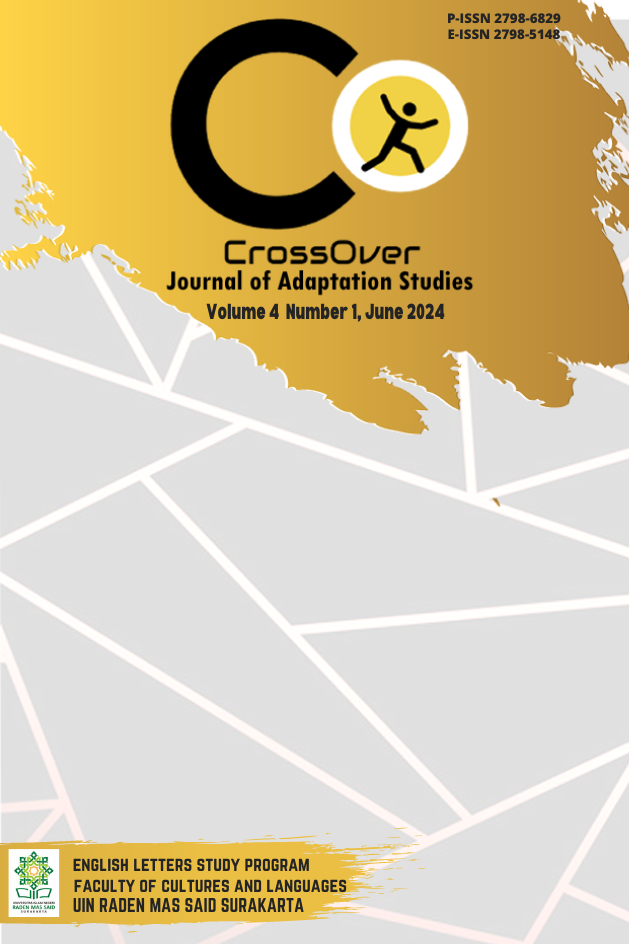THE IMPACTS OF DIEGETIC STRATEGIES ON THE LOCALIZATION QUALITY OF GENSHIN IMPACTS' ACHIEVEMENT FEATURES
DOI:
https://doi.org/10.22515/crossover.v4i1.8898Keywords:
Spatialization, Translation Strategies, Localization, Achievement, Genshin ImpactAbstract
The aim of this thesis is to find out how the strategy of achievement on Genshin Impact term is translated from English into Indonesian in video game. This research uses qualitative method to explore the objectives of the research. The researcher collected data through several steps which aims are: to find the translation strategy contained in the video game, to classify and analyze the types of translation strategy from Achievements on Genshin Impact based on Purnomo translation strategy in video games theory, then determine the most dominant type of translation strategy and describe the translation strategy of Genshin Impact and finally concluded the result. The results of this research showed that Purnomo's (2019) proposed strategies for translating video games are used, 149 data were found, classified into the following categories: 2 Abbreviation, 13 Condensation, 13 Omission, 8 Symbolization, 88 Retention, and 25 Mediation. Therefore, the dominant data is Retention, which means that Retention is used to preserve source language words or terms that are considered and accepted conventionally by gamers and become fatal if translated. Based on the analysis, the localization quality assessment reveals that Achievements in Genshin Impact localization achieve a "Good" rating, with an average score of 2.8.
Downloads
References
Annisa, A.N. (2019). Localization Quality Assessment for Video Game Subtitle Entitled “Sastrasuki. Unpublished thesis. UIN Raden Mas Said Surakarta
Bartoll, E. (2008). Learning to subtitle online: Learning environment, exercises, and evaluation. John Benjamins.
Bernal-Merino. (2009). Video games and children's books in translation. The Journal of Specialised Translation, 11, 234-247, https://jostrans.soap2.ch/issue11/art_bernal.pdf.
Bruce, B & Howard, L. (2012). Qualitative Research Methods for the Social Sciences. Pearson.
Chandler, H, M. (2005). The Game Localization Handbook. Charles River Media.
Fry, D. (2003). The Localization Primer. Revised by Arle Lommel. Localization Industry Standards Association (LISA).
Google Play. (2023). Genshin Impact. Retrieved January 26, 2023, from https://play.google.com/store/apps/details?id=com.miHoYo.GenshinImpact.
Google Play. (2023). Game Terbaik 2020. Retrieved January 26, 2023, from https://play.google.com/store/apps/topic?id=campaign_editorial_bestof2020_bestgame.
Hevia, C. M. (2006). Video Games Localisation: Posing New Challenges to the Translator. Perspectives: Study in Translology, 14(4), 306-323, https://www.researchgate.net/publication/290008311_Video_games_localisation_Posing_new_challenges_to_the_translator
Jaya, S.S. (2019). Video game Translation: An Analysis of Translation Techniques and Quality of Agricultural Technical Terms in Video Game Entitled Harverst Moon Back to Nature. Thesis. Universitas Sebelas Maret.
Krathwohl, D. R. (1993). Methods of Educational and Social Science Research: An Integrated Approach. Waveland Press, Inc.
Madigan, J. (2016). Why Do Achievements, Trophies, and Badges Work?. Retrieved January 26, 2023, from https://www.psychologyofgames.com/2016/07/why-do-achievements-trophies-and-badges-work/.
Mangiron, C. & O’Hagan, M. (2006). Game Localization: Unleashing Imagination with ‘restriced’ translation. The Journal of Specialised Translation, 6, 10-21, https://ddd.uab.cat/pub/artpub/2006/143140/jostrans_a2006n6p10.pdf
Mangiron, C. & O’Hagan, M. (2013). Game Localization: Translating for the Global Digital Entertainment Industry. John Benjamins.
Meleong, L, J. (2001). Metodologi Penelitian Kualitatif. PT. Remaja Roda Karya.
O’Hagan, M. (2007). Video games as a new domain for translation research: From translating text to translating experience. Tradumàtica.
O’Hagan, M. (2009). Towards a cross-cultural game design: an explorative study in understanding the player experience of a localised Japanese video game. Journal of Specialised Translation, 11 (1), 211-233.
Purnomo, S, L, A. (2019). Studies on Shift. Fakultas Adab dan Bahasa IAIN Surakarta.
Purnomo, S, L, A. (2018). Model Pelokalan Video Game Berbasis Lufikasi. Unpublished Doctoral Disertation. Sebelas Maret University, Surakarta.
Rayward, W, B. (1994). Visions of Xanadu: Paul Otlet (1868-1944) and Hypertext.
Sugiyono. (2008). Metode Penelitian Kuantitatif, Kualitatif dan R&D. Alfabeta.
Suryawan, N.H. (2018). The Strategy of Video Games Contents Translation in ‘Grand Chase-M’ Game. Thesis. UIN Syarif Hidayatullah. https://repository.uinjkt.ac.id/dspace/bitstream/123456789/41623/1/Fulltext.pdf
Downloads
Published
How to Cite
Issue
Section
Citation Check
License
Copyright (c) 2024 Nabil Aqib

This work is licensed under a Creative Commons Attribution-ShareAlike 4.0 International License.
Authors retain copyright and grant the journal right of first publication with the work simultaneously licensed under a Creative Commons Attribution 4.0 International License that allows others to share the work with an acknowledgment of the work's authorship and initial publication in this journal.

















